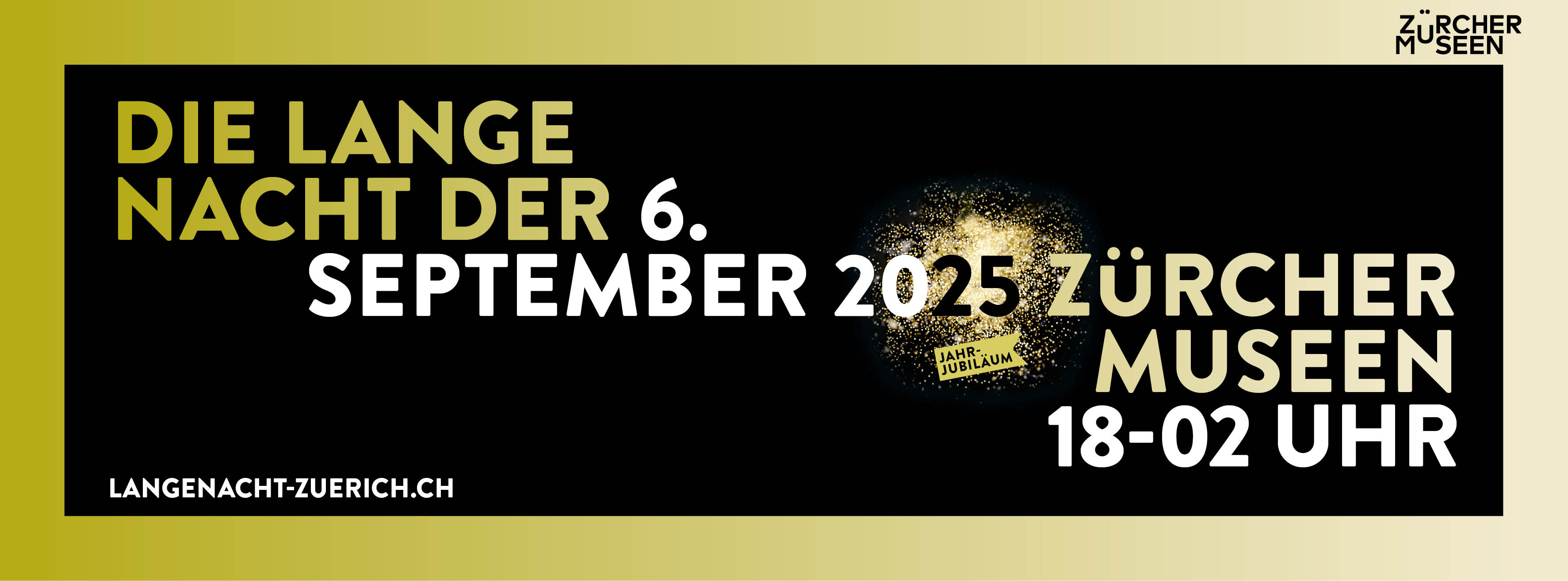Zurich's Long Night of Museums 2025

The countdown is on. Zurich's Long Night of Museums will take place again on Saturday, 6 September 2025! We will be there with a varied programme and would like to present all facets of research at the Faculty of Science at UZH. From 6 pm to 1 am, talks and guided tours invite you to discover. Tacos and churros will provide refreshments in between.
Advance ticket sales will be handled online - via Eventfrog. There is no box office.
You can find tickets here.
You can view the programme of the other museums here from July 2025.
Continuous events
- 6 pm - 1 am: Ask a scientist
On this evening, the Science Pavilion UZH team will answer all your questions about scientific research at the University of Zurich. How is biodiversity measured? Why are we looking for evidence of dark matter in a mine 1600 metres underground? Do other animals use tools the way we humans do? Satisfy your thirst for knowledge. The Master's students, PhD students and scientists are looking forward to your questions! -
7 - 9 pm: Ask a physicist
Have you always wondered what the researchers at CERN are looking for? Would you like to find out more about the components of the universe? At Zurich's Long Night of Museums, you have the opportunity to ask all these and many other questions and discuss them with physicist Dr Katharina Müller. Come and quench your thirst for knowledge. -
9:30 - 11 pm: Ask a chemist
What is radiochemistry? What are radiotracers? And how can it be used for the diagnosis and treatment of cancer? Find out more about nuclear medicine and the latest advances at the University of Zurich in this field. Chemist Dr René Oetterli will answer your questions about chemistry and chemical research at the University of Zurich. -
10:30 - 11:30 pm: Ask a mathematician
Did you know that chaos has rules? Or that it has something to do with pretzels? Mathematician Prof Corinna Ulcigrai deals with chaotic systems in her work. At Zurich's Long Night of Museums, she will answer burning questions about mathematics and show you the beauty of a mathematical idea.
Single Events
- 6 - 6:30 pm: Ask an anthropologist
What do communication, cooperation and culture look like in other animals? The ‘Ape Behaviour and Ecology’ research group at the University of Zurich studies wild apes to find out more about us humans. How can we study these behaviours? Prof Kathelijne Koops shows the differences, but above all the similarities between us and other apes, talks about her fascinating research and shows what makes us human. - 7 - 7:20 pm and 8:30 - 8:50 pm: 100 Years Quantum Mechanics (in German)
100 years ago, Zurich was at the epicentre of the development of quantum mechanics, which explained the microscopic world in a new way. In this guided tour through the exhibition ‘Quantum Century - Zurich and the birth of quantum mechanics’ in the University Library of Natural Sciences, we will look at Zurich's role, the key concepts of the quantum world and modern applications of quantum mechanics. - 7:30 - 7:50 pm: Quantum Century
Quantum mechanics delivered a new set of revolutionary physics concepts. This talk will cover the “crisis” that led to the foundation of the quantum mechanics and explain the modern technological implications (for our daily life). Special focus will be give to quantum developments associated with Zurich. - 9 - 9:20 pm: Why is nature as it is?
Real worlds, imaginary worlds, and the role of constraints.
Scientists are embarked on the task of describing the world and trying to explain it. Artists, on the other hand, have the freedom to imagine alternative worlds. These two lines of inquiry seem at odds with each other. And yet, some of the most interesting approaches in science have embraced the task of imaging alternative worlds. This forces us to ask ourselves one of the most fundamental questions in biology: why are there some forms inherent in nature and not others? - 9:30 - 9:50 pm: Everything grows exponentially. Really? (in German)
Many things in nature and in the economy are growing exponentially. But not everything!
The population, the economy, debt, not just the cells of a tissue through cell division, the temperature on earth, knowledge, the circumference of the stomach - simply everything grows ‘exponentially’! This is the impression you get when you observe the inflationary use of this expression. Oh yes, inflation: prices are of course also growing exponentially. And what about the Covid-19 epidemic? Mathematician Dr Christoph Luchsinger clarifies. - 10:15 - 10:35 pm: One Health - What do animal diseases, environmental protection and human health have in common? Quite a lot!
One Health takes a holistic approach to health - and affects us all.
The University of Zurich founded its own One Health Institute in 2023. Members of the One Health Institute use illustrative examples to show how closely our well-being is linked to that of animals and the environment - and why we should work together for a healthy future. -
11:15 - 11:35 pm: Radiotracer - How radiochemistry makes the invisible visibleJoin us on a fascinating journey through time and technology: from Henri Becquerel's ground-breaking discovery of radioactivity in 1896, to the pioneering work of Marie Curie, to the ultra-modern radiomedicine of today. We show how radiotracers provide insights into hidden processes in the human body - precise, painless and life-saving. Find out how radiochemical procedures detect diseases at an early stage, enable new therapies and drive forward personalised medicine. Complex chemistry is vividly explained. Immerse yourself in the world of radiation - invisible, but of inestimable value for research and health.